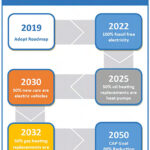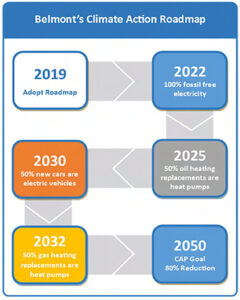
By Brian Iler
While providing $290,633 to BMHS Building Committee to complete the full solar array is an encouraging development from both a fiscal and environmental perspective, this observer is discouraged by the fact that the Select Board’s deliberations never included a mention of the climate-positive effect of the scheme. Instead, it was a 100% fiscal argument that carried the day.
There are obvious reasons for this. Everyone can agree with a proposal that saves the town money. It’s a political no-brainer. What’s not clear is whether the town shares a sense of its moral responsibility to decrease its contribution to the existential threat of global warming.
Is this because too many people don’t believe in this threat? Or that we can’t make much of a contribution as a minor player on the global stage? Or is there a disconnect between our intellectual acknowledgment of the problem and our responsibility to change how we do business and make real-world decisions to address it?
Belmont’s residents and elected representatives have repeatedly voted to support climate action goals. Some compelling examples include:
- In 2009, Town Meeting and the Select Board endorsed a Climate Action Plan that included a goal of reducing carbon emissions in Belmont by 80% by 2050
- In 2019, 88% of Town Meeting voted to support the Climate Action Plan Roadmap
- In 2020, 76% of Belmont voters voted “Yes” to State-wide Ballot Question 3 on 100% renewable energy use within the next two decades.
- In 2022, 91% of Town Meeting members voted to support the BMHS Building Committee installing the full solar array
- Despite these examples, when it comes down to putting our money where our votes are, we blanch, cower, and hide behind “fiscal responsibility” or “insufficient staffing.” We don’t rise to the challenge.
The solar panel good news related earlier was yet another example of an effort that is “ . . . ad hoc or in response to the demand by community members,” as written in the Metropolitan Area Planning Council’s (MAPC) Net Zero Implementation Strategies report presented to the Select Board on February 6. The MAPC takeaway: Belmont leads the pack in big talk but falls down on implementation.
In 2009, we committed to reducing CO2 by 80% by 2050. Ten years later, “Belmont is not making nearly enough progress toward its climate goal,” according to the Belmont’s Climate Action Plan Roadmap. Today, despite incremental (ad hoc and community member-demanded) victories like the school solar array, we continue to lag significantly behind our goals. Even this modest progress is remarkable considering that we rely on a committed group of volunteers (the energetic Energy Committee, Sustainable Belmont, and other concerned residents) to encourage, cajole, or beg town departments and committees to make good on our shared goals.
Belmont is currently designated a “Green Community,” an official state status that gives participating towns access to state resources, “to help municipalities reduce energy use and costs by implementing clean energy projects in municipal buildings, facilities, and schools.” Belmont received more than $400,000 in grant money from this Green Community program in 2014 and 2017, but in every other year we’ve left at least $200,000 on the table, totalling more than $1.6 million. Why?
Our certification as a Green Community relies on Belmont Light staff’s dogged data collection from unresponsive town departments. (By the way, it’s not Belmont Light’s job, but they do it, thank you). Certification is also contingent upon the town adopting a municipal electric vehicle purchasing program. The Energy Committee researched and wrote a thorough plan and submitted it to the town administration for approval, where it has languished for months.
If Belmont is serious about meeting its climate goals, it must take action. We must hire a sustainability grant manager as requested by the Energy Committee on December 19 in front of the Select Board. This person will pay for their position many times over by identifying, applying for, and stuffing the Belmont town coffers with grant money, which we can then use to fund the programs we need to achieve the climate goals we’re so proud of setting, but are so timid about achieving. The Select Board summarily shot down this sustainability grant manager proposal at its December 19 meeting.
A month later, at the MAPC presentation, the Select Board chair lamented that “we’re falling behind on our Climate Action Roadmap, without question.” Hmmm. Winchester, Lexington, Arlington, Watertown, Acton, Beverly, Melrose, Concord, Newton, and Framingham . . . all have full-time sustainability staff, bringing in grant money, saving their towns money on energy costs, and coordinating renewable energy efforts across multiple departments. They are making realprogress toward their goals. What is Belmont’s excuse for not having this essentially self-funded position? And by the way, who is going to write the grant proposal to bring home the $665,000 federal dollars mentioned above from our investment in the school’s solar array? The town is already spending this money without even having a person to apply for it in the first place.
If Belmont is serious about meeting its climate goals, the Select Board will demand that the town administrator and key department heads be evaluated for progress on the town’s climate goals, with salary increases contingent upon performance in this area.
If Belmont is serious about meeting its climate goals, we would require that the building committees for our major town buildings have charges that explicitly require Zero Net Energy designs and consideration for future operating costs instead of simple “design and build” directives.
If Belmont is serious about meeting its climate goals, the town will create a sustainability manager staff position and support this person’s programs across all town departments.
If Belmont is serious . . . is Belmont serious?
We are no better than the astoundingly oblivious Belmont Hill School, with their 1960s-style proposal to pave several acres of woodland to construct a parking lot to enable all of their students to drive their cars to school every day. Does the rest of Belmont live in the same cocoon as the privileged prep school, conducting business as usual as the planet heats up and thousands of species disappear? Where is the vision? Where is the commitment?
Keep these issues in mind as you vote in April.
Brian Iler is a 25-year Belmont resident and father of three Belmont High School graduates.



Sorry, the comment form is closed at this time.